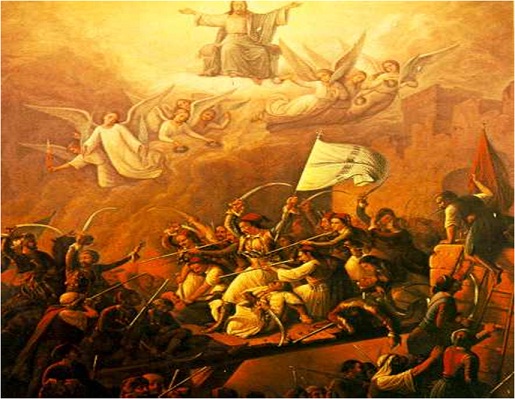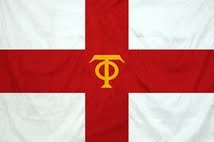Εκοιμήθη ο Επίσκοπος Ρεντίνης Σεραφείμ ( Kαλογερόπουλος)
Καλό ταξίδι αγαπητέ Πατέρα Σεραφείμ!
Αναπαύσου εν Ειρήνη στην αγκαλιά του Κυρίου μας…

Συναυλία Εκκλησιαστικής και Παραδοσιακής μουσικής
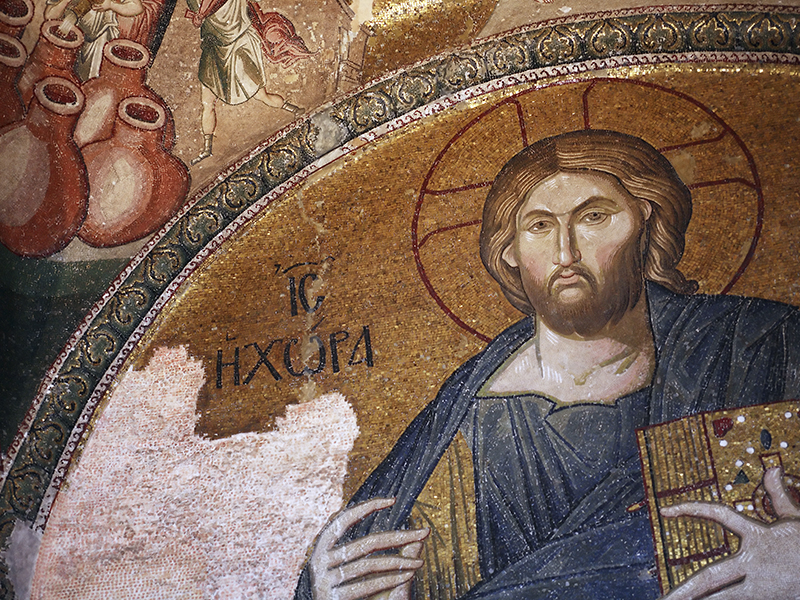
Την Κυριακή 10/4 η Χορωδία της Δευτεροβάθμιας Εκκλησιαστικής Εκπαίδευσης παρουσιάζει τη Συναυλία Εκκλησιαστικής & Παραδοσιακής Μουσικής «Ἡ ὁδός, ἡ ἀλήθεια καὶ ἡ ζωή» στο Φιλολογικό Σύλλογο “Παρνασσός”.
Είσοδος ελεύθερη, κρατήσεις θέσεων: bekiari@minedu.gov.gr
Ορθοδοξία η ΚΙΒΩΤΟΣ!
Η Ορθοδοξία είναι η Κιβωτός που θα πάει την Πατρίδα μας στον 21 αιώνα ο οποίος “ή θα είναι πνευματικός ή δεν θα υπάρξει καθόλου”…
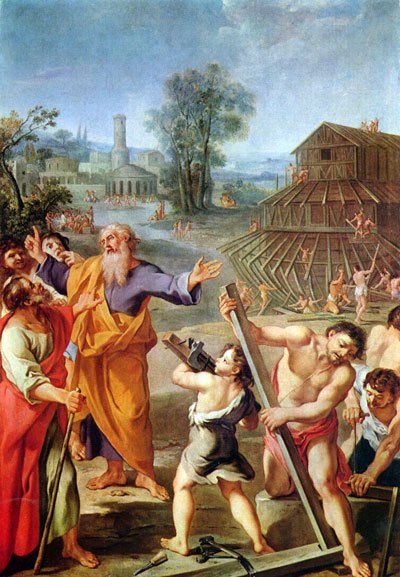
Ευαγγελισμός της Θεοτόκου
“…διότι ἀφῄρηται ὁ ζυγὸς ὁ ἐπ᾿ αὐτῶν κείμενος καὶ ἡ ῥάβδος ἡ ἐπὶ τοῦ τραχήλου αὐτῶν· τὴν γὰρ ῥάβδον τῶν ἀπαιτούντων διεσκέδασε Κύριος, ὡς τῇ ἡμέρᾳ τῇ ἐπὶ Μαδιάμ.
ὅτι πᾶσαν στολὴν ἐπισυνηγμένην δόλῳ καὶ ἱμάτιον μετὰ καταλλαγῆς ἀποτίσουσι καὶ θελήσουσιν εἰ ἐγενήθησαν πυρίκαυστοι.
ὅτι παιδίον ἐγενήθη ἡμῖν, υἱὸς καὶ ἐδόθη ἡμῖν, οὗ ἡ ἀρχὴ ἐγενήθη ἐπὶ τοῦ ὤμου αὐτοῦ, καὶ καλεῖται τὸ ὄνομα αὐτοῦ μεγάλης βουλῆς ἄγγελός, θαυμαστὸς σύμβουλος, Θεὸς ἰσχυρός, ἐξουσιαστής, ἄρχων εἰρήνης, πατὴρ τοῦ μέλλοντος αἰῶνος· ἐγὼ γὰρ ἄξω εἰρήνην ἐπὶ τοὺς ἄρχοντας, εἰρήνην καὶ ὑγίειαν αὐτῷ…” (Ησαίας 9,4)
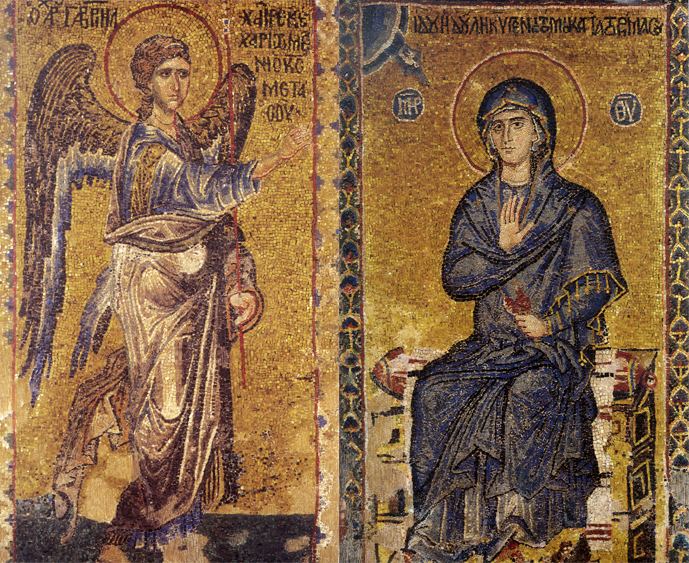
Η δική μας “αναγέννηση”
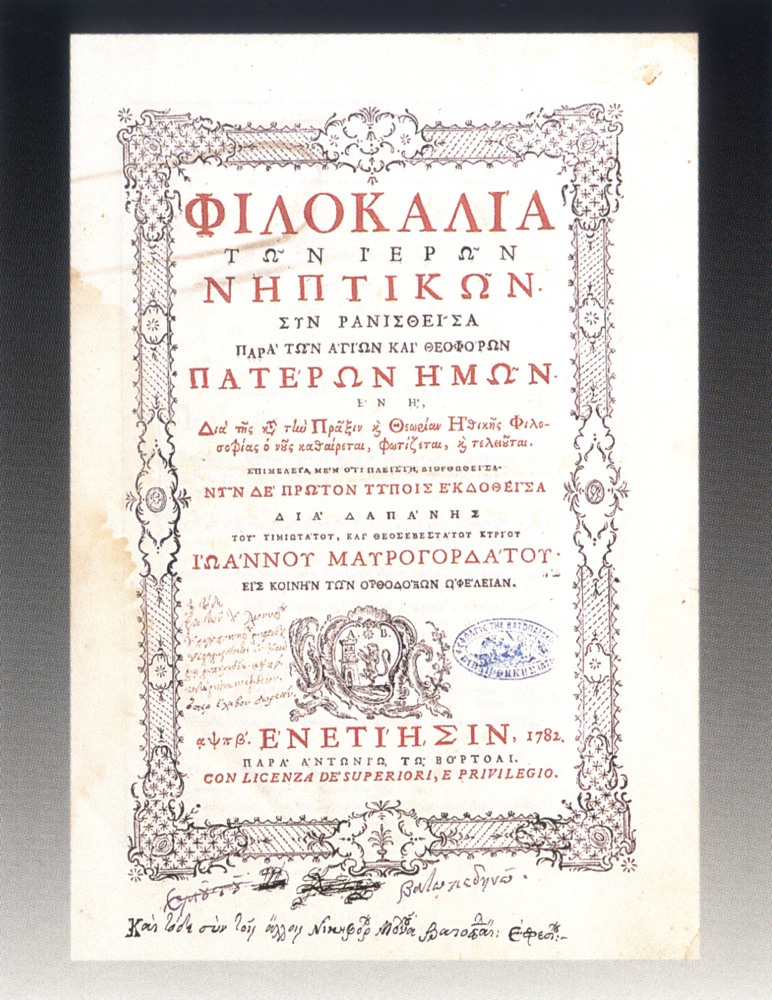 Εμείς σε αντίθεση με τη δύση έχουμε τη δική μας “αναγέννηση”. Είμαστε όλοι τέκνα της Φιλοκαλικής Αναγέννησης!… (Η “Φιλοκαλία” ΕΔΩ)
Εμείς σε αντίθεση με τη δύση έχουμε τη δική μας “αναγέννηση”. Είμαστε όλοι τέκνα της Φιλοκαλικής Αναγέννησης!… (Η “Φιλοκαλία” ΕΔΩ)
Κατα την τάξη Μελχισεδέκ
 1 Οὗτος γὰρ ὁ Μελχισεδέκ, βασιλεὺς Σαλήμ, ἱερεὺς τοῦ Θεοῦ τοῦ ὑψίστου, ὁ συναντήσας ᾿Αβραὰμ ὑποστρέφοντι ἀπὸ τῆς κοπῆς τῶν βασιλέων καὶ εὐλογήσας αὐτόν,
1 Οὗτος γὰρ ὁ Μελχισεδέκ, βασιλεὺς Σαλήμ, ἱερεὺς τοῦ Θεοῦ τοῦ ὑψίστου, ὁ συναντήσας ᾿Αβραὰμ ὑποστρέφοντι ἀπὸ τῆς κοπῆς τῶν βασιλέων καὶ εὐλογήσας αὐτόν,
2 ᾧ καὶ δεκάτην ἀπὸ πάντων ἐμέρισεν ᾿Αβραάμ, πρῶτον μὲν ἑρμηνευόμενος βασιλεὺς δικαιοσύνης, ἔπειτα δὲ καὶ βασιλεὺς Σαλήμ, ὅ ἐστι βασιλεὺς εἰρήνης,
3 ἀπάτωρ, ἀμήτωρ, ἀγενεαλόγητος, μήτε ἀρχὴν ἡμερῶν μήτε ζωῆς τέλος ἔχων, ἀφωμοιωμένος δὲ τῷ υἱῷ τοῦ Θεοῦ, μένει ἱερεὺς εἰς τὸ διηνεκές.
4 Θεωρεῖτε δὲ πηλίκος οὗτος, ᾧ καὶ δεκάτην ᾿Αβραὰμ ἔδωκεν ἐκ τῶν ἀκροθινίων ὁ πατριάρχης.
5 καὶ οἱ μὲν ἐκ τῶν υἱῶν Λευῒ τὴν ἱερατείαν λαμβάνοντες ἐντολὴν ἔχουσιν ἀποδεκατοῦν τὸν λαὸν κατὰ τὸν νόμον, τοῦτ’ ἔστι τοὺς ἀδελφοὺς αὐτῶν, καίπερ ἐξεληλυθότας ἐκ τῆς ὀσφύος ᾿Αβραάμ·
6 ὁ δὲ μὴ γενεαλογούμενος ἐξ αὐτῶν δεδεκάτωκε τὸν ᾿Αβραάμ, καὶ τὸν ἔχοντα τὰς ἐπαγγελίας εὐλόγηκε.
7 χωρὶς δὲ πάσης ἀντιλογίας τὸ ἔλαττον ὑπὸ τοῦ κρείττονος εὐλογεῖται.
8 καὶ ὧδε μὲν δεκάτας ἀποθνήσκοντες ἄνθρωποι λαμβάνουσιν, ἐκεῖ δὲ μαρτυρούμενος ὅτι ζῇ.
9 καὶ ὡς ἔπος εἰπεῖν, διὰ ᾿Αβραὰμ καὶ Λευῒ ὁ δεκάτας λαμβάνων δεδεκάτωται·
10 ἔτι γὰρ ἐν τῇ ὀσφύϊ τοῦ πατρὸς ἦν ὅτε συνήντησεν αὐτῷ ὁ Μελχισεδέκ.
11 Εἰ μὲν οὖν τελείωσις διὰ τῆς Λευϊτικῆς ἱερωσύνης ἦν· ὁ λαὸς γὰρ ἐπ’ αὐτῇ νενομοθέτητο· τίς ἔτι χρεία κατὰ τὴν τάξιν Μελχισεδὲκ ἕτερον ἀνίστασθαι ἱερέα καὶ οὐ κατὰ τὴν τάξιν ᾿Ααρὼν λέγεσθαι;
12 μετατιθεμένης γὰρ τῆς ἱερωσύνης ἐξ ἀνάγκης καὶ νόμου μετάθεσις γίνεται.
13 ἐφ’ ὃν γὰρ λέγεται ταῦτα, φυλῆς ἑτέρας μετέσχηκεν, ἀφ’ ἧς οὐδεὶς προσέσχηκε τῷ θυσιαστηρίῳ.
14 πρόδηλον γὰρ ὅτι ἐξ ᾿Ιούδα ἀνατέταλκεν ὁ Κύριος ἡμῶν, εἰς ἣν φυλὴν οὐδὲν περὶ ἱερωσύνης Μωϋσῆς ἐλάλησε.
15 Καὶ περισσότερον ἔτι κατάδηλόν ἐστιν, εἰ κατὰ τὴν ὁμοιότητα Μελχισεδὲκ ἀνίσταται ἱερεὺς ἕτερος,
16 ὃς οὐ κατὰ νόμον ἐντολῆς σαρκικῆς γέγονεν, ἀλλὰ κατὰ δύναμιν ζωῆς ἀκαταλύτου·
17 μαρτυρεῖ γὰρ ὅτι σὺ ἱερεὺς εἰς τὸν αἰῶνα κατὰ τὴν τάξιν Μελχισεδέκ.
18 ἀθέτησις μὲν γὰρ γίνεται προαγούσης ἐντολῆς διὰ τὸ αὐτῆς ἀσθενὲς καὶ ἀνωφελές·
19 οὐδὲν γὰρ ἐτελείωσεν ὁ νόμος, ἐπεισαγωγὴ δὲ κρείττονος ἐλπίδος, δι’ ἧς ἐγγίζομεν τῷ Θεῷ.
20 καὶ καθ’ ὅσον οὐ χωρὶς ὁρκωμοσίας· οἱ μὲν γὰρ χωρὶς ὁρκωμοσίας εἰσὶν ἱερεῖς γεγονότες,
21 ὁ δὲ μετὰ ὁρκωμοσίας διὰ τοῦ λέγοντος πρὸς αὐτόν· ὤμοσε Κύριος, καὶ οὐ μεταμεληθήσεται· σὺ ἱερεὺς εἰς τὸν αἰῶνα κατὰ τὴν τάξιν Μελχισεδέκ· 22 κατὰ τοσοῦτον κρείττονος διαθήκης γέγονεν ἔγγυος ᾿Ιησοῦς.
23 Καὶ οἱ μὲν πλείονές εἰσι γεγονότες ἱερεῖς διὰ τὸ θανάτῳ κωλύεσθαι παραμένειν·
24 ὁ δὲ διὰ τὸ μένειν αὐτὸν εἰς τὸν αἰῶνα ἀπαράβατον ἔχει τὴν ἱερωσύνην·
25 ὅθεν καὶ σῴζειν εἰς τὸ παντελὲς δύναται τοὺς προσερχομένους δι’ αὐτοῦ τῷ Θεῷ, πάντοτε ζῶν εἰς τὸ ἐντυγχάνειν ὑπὲρ αὐτῶν.
26 Τοιοῦτος γὰρ ἡμῖν ἔπρεπεν ἀρχιερεύς, ὅσιος, ἄκακος, ἀμίαντος, κεχωρισμένος ἀπὸ τῶν ἁμαρτωλῶν καὶ ὑψηλότερος τῶν οὐρανῶν γενόμενος,
27 ὃς οὐκ ἔχει καθ’ ἡμέραν ἀνάγκην, ὥσπερ οἱ ἀρχιερεῖς, πρότερον ὑπὲρ τῶν ἰδίων ἁμαρτιῶν θυσίας ἀναφέρειν, ἔπειτα τῶν τοῦ λαοῦ· τοῦτο γὰρ ἐποίησεν ἐφάπαξ ἑαυτὸν ἀνενέγκας.
28 ὁ νόμος γὰρ ἀνθρώπους καθίστησιν ἀρχιερεῖς ἔχοντας ἀσθένειαν, ὁ λόγος δὲ τῆς ὁρκωμοσίας τῆς μετὰ τὸν νόμον υἱὸν εἰς τὸν αἰῶνα τετελειωμένον.
Επίτιμος δημότης Αιγίνης ο Πρόεδρος της Δημοκρατίας

Στην αντιφώνησή του, δήλωσε:
«Αποδεχόμενος, ασμένως, τη μεγάλη τιμή που μου περιποιείτε ανακηρύσσοντάς με επίτιμο δημότη του δήμου Αίγινας και με τη διευκρίνιση ότι συναισθάνομαι, πλήρως, πως η τιμή αυτή δεν αφορά το πρόσωπό μου, αλλά τον πολιτειακό θεσμό τον οποίον, προσκαίρως, εκπροσωπώ, σας διαβεβαιώνω ότι αναλαμβάνω, στο ακέραιο, την ευθύνη να ενεργώ εφεξής και ως θεματοφύλακας της αενάως λάμπουσας ιστορικής μνήμης, η οποία αναβλύζει πλουσίως από την Αίγινα. Στην οποία, με βάση το παρελθόν της αλλά και το μέλλον που της ανήκει, ταιριάζει ο στίχος του Οδυσσέα Ελύτη από το “‘Αξιον Εστί”: “Αυτός ο τόπος ο μικρός, ο μέγας”.
Από τις συνθήκες αυτές, μου είναι αδύνατο να διατρέξω εκτενώς την ιστορική διαδρομή της Αίγινας. Και γι’ αυτό ας μου επιτραπεί να μείνω, με όλο τον κίνδυνο της υποκειμενικής αυθαιρεσίας, σ’ ορισμένους, ευάριθμους, ιστορικούς σταθμούς: Η ιστορία της Αίγινας χάνεται στα βάθη των αιώνων. Ένα πρώτο αποτύπωμά της βρίσκεται στον ναό της Αφαίας, που πήρε τ’ όνομά του από την Άφα, κατά τη μυθολογία θεότητα κρητικής καταγωγής, η οποία εμφανίσθηκε ως Βριτόμαρτις ή Δίκτυννα, κόρη του Δία και της Κάρμης, σύντροφος της Αρτέμιδος. Για να ξεφύγει από την καταδίωξη του Μίνωα, μπήκε σε δίχτυα ψαράδων κι έφθασε στην Αίγινα, όπου κρύφθηκε στο ιερό άλσος, προκειμένου να μείνει άφαντη. Εξ ου και Αφαία. Ο ναός της, χτισμένος στις αρχές του 5ου αιώνα πΧ, έγινε “δεύτερο σπίτι” της θεάς Αθηνάς, μετά τον Παρθενώνα, ώσπου να αποκαλυφθεί η αρχική του αφιέρωση. Μνημειώδης παραμένει η οικονομική και, ειδικότερα, εμπορική δραστηριότητα των κατοίκων της Αίγινας, σε ξηρά και θάλασσα. Κάτι που δείχνει ότι οι Έλληνες, γενικώς, δεν είχαν τίποτε να ζηλέψουν από την αντίστοιχη δραστηριότητα των Φοινίκων. Δείγμα γραφής, διόλου ευκαταφρόνητο, αυτού του εμπορικού δαιμονίου συνιστά το γεγονός ότι στην Αίγινα κόπηκε και κυκλοφόρησε το πρώτο νόμισμα επί ευρωπαϊκού εδάφους -ο στατήρας με το σχήμα χελώνας- κι ένα από τα πρώτα στον κόσμο, μετά τους Λυδούς, κατά τον 7ο αιώνα πΧ. Κι έρχομαι σε πολύ νεώτερους χρόνους, τότε που το ελληνικό κράτος έκανε τα πρώτα του βήματα διαρκούντος ακόμη, ουσιαστικώς, του Αγώνα της Εθνεγερσίας, ο οποίος είχε ως αφετηρία το 1821. Και μιλώ, φυσικά, για την άφιξη στην Αίγινα του πρώτου Κυβερνήτη του νεοσύστατου ελληνικού κράτους. Ειδικότερα: Αφήνοντας πίσω του μία λαμπρή και ακόμη περισσότερα υποσχόμενη, άνετη, σταδιοδρομία διπλωμάτη στην τσαρική ρωσική αυλή -ας μην ξεχνάμε ότι δεν δέχθηκε ούτε την τιμητική σύνταξη που του χορηγήθηκε- ο Ιωάννης Καποδίστριας, εκλεγμένος από τη Γ’ Εθνοσυνέλευση της Τροιζήνας, έφθανε στην Αίγινα και ορκιζόταν πρώτος Κυβερνήτης της Ελλάδας, στις 26 Ιανουαρίου 1828, ανταποκρινόμενος στο κάλεσμα της ελεύθερης, μα μικρής και ρημαγμένης πατρίδας, για την ανόρθωση και ανασύνταξή της. Αφιέρωσε, κυριολεκτικώς, τον εαυτό του στον ιερό αυτό σκοπό βάζοντας, πάνω από τα ερείπια, τις βάσεις για μιαν Ελλάδα αντάξια του παρελθόντος της αλλά και της προοπτικής της. Ακαταπόνητος και αποφασιστικός, εργάσθηκε “με λογισμό και μ’ όνειρο”, για να θυμηθούμε τον στίχο του Διονυσίου Σολωμού στους “Ελεύθερους Πολιορκημένους”.
Μόλις τριάμισι χρόνια αργότερα, στις 27 Σεπτεμβρίου 1831, η δολοφονία του στο Ναύπλιο -καθαρώς πολιτική δολοφονία- έβαλε θλιβερό τέλος στο μεγαλόπνοο έργο του. Υπό τις συνθήκες αυτές, η μνήμη του Ιωάννη Καποδίστρια, ιδίως κατά τη σημερινή πολλαπλώς κρίσιμη συγκυρία, δεν ανήκει μόνο στην ιστορία. Αποτελεί, για όλους μας, δείκτη πορείας, προκειμένου ν’ αντιληφθούμε, καθένας στο μέτρο που του αναλογεί, για την Ελλάδα μας αυτό που συμπυκνώνει καιρίως ένας άλλος ποιητικός στίχος, του Ιωάννη Πολέμη: “Τι έχασε, τι έχει, τι της πρέπει”. Δεν θα μπορούσε να φαντασθεί κάποιος τη σύγχρονη Αίγινα δίχως τον θρησκευτικό της “βιγλάτορα”, τον Άγιο Νεκτάριο, κατά κόσμον Νεκτάριο Κεφαλά, του οποίου ο σύγχρονος επιβλητικός ναός δεσπόζει πνευματικώς, και όχι μόνον. Μετά το τέλος της θητείας του ως διευθυντή της Ριζαρείου, ο Άγιος Νεκτάριος μόνασε στην Αίγινα, από το 1908 ως το 1920 όταν “εκοιμήθη”, στο εγκαταλελειμμένο μοναστήρι της Ζωοδόχου Πηγής, το οποίο αναστήλωσε ως μονή της Αγίας Τριάδας. Στις 20 Απριλίου του 1961, ο τότε Οικουμενικός Πατριάρχης Αθηναγόρας, εκτιμώντας εκκλησιαστικώς, μεταξύ άλλων φυσικά, τα θεία σημάδια των λειψάνων του, τον ανακήρυξε Άγιο, τον νεότερο Άγιο της πίστης μας. Ακόμη πιο σύγχρονο σημάδι μνήμης της Αίγινας “ακτινοβολεί” το Καποδιστριακό Ορφανοτροφείο, που μετά τη δολοφονία του Κυβερνήτη έχασε τον αρχικό του προορισμό, κι ακόμη χειρότερα, μεταξύ 1880 και 1984, λειτούργησε ως φυλακή.
Μία φυλακή, που στα χρόνια της στυγνής δικτατορίας 1967-1974 έκλεισε μέσα της ορισμένες από τις πιο εμβληματικές πολιτικές μορφές της μεταπολιτευτικής μας ζωής. Και μ’ αυτόν τον τρόπο σηματοδοτεί για πάντα τις ανεξίτηλες αξίες της Αντίστασης και της Δημοκρατίας. Σήμερα, η Αίγινα φαίνεται να ζει στη σκιά του αφύσικα “μεγαλιθικού” λεκανοπεδίου και της ιστορικής και πολεοδομικής “καρδιάς” του, της Αθήνας. Όμως, με βάση την ιστορία της και την προοπτική της, οφείλουμε να φανταζόμαστε την Αίγινα ως ένα “κανάτι”, το οποίο όχι μόνο φυλάσσει στοργικά μέσα του ανεκτίμητο νερό ιστορίας αλλά κι εξακολουθεί πάντα να ποτίζει τη γη του τόπου μας, προκειμένου να βλαστήσει ο σπόρος της δικής μας ιστορικής αποστολής. Ακριβώς μ’ αυτές τις “αποσκευές” χρέους φεύγω σήμερα από την Αίγινα».

